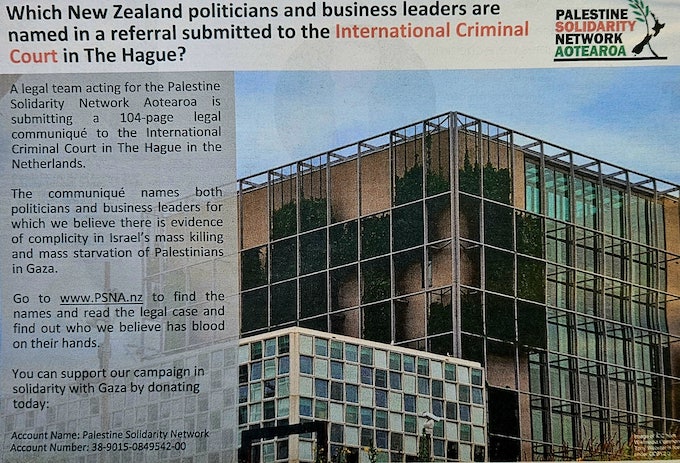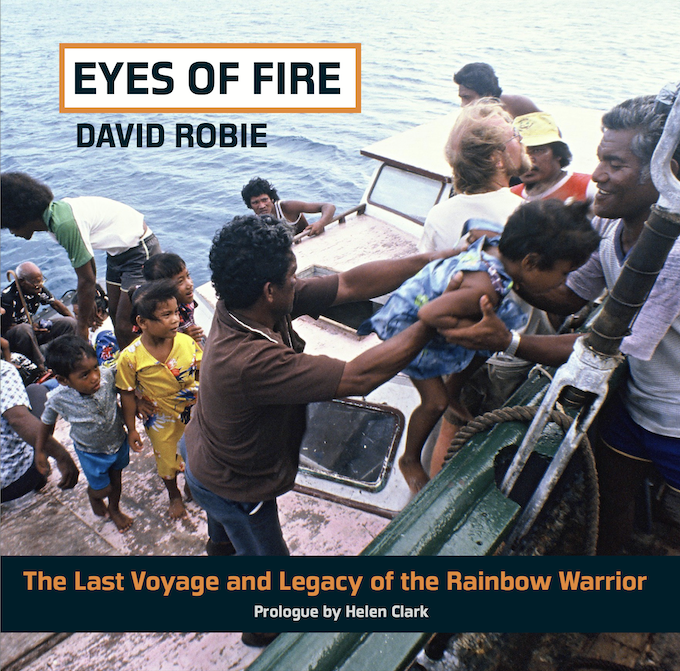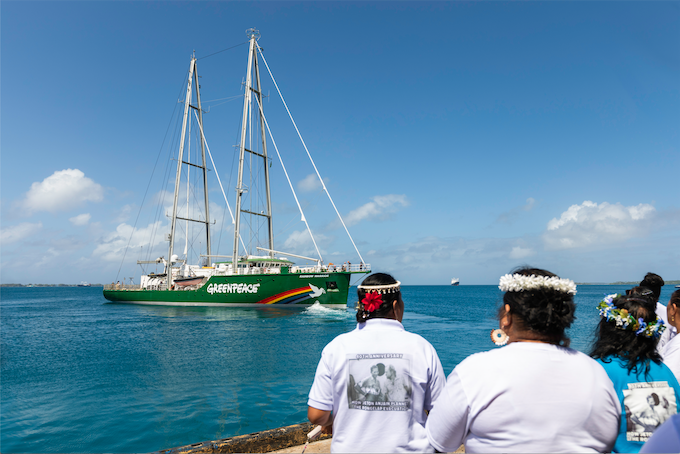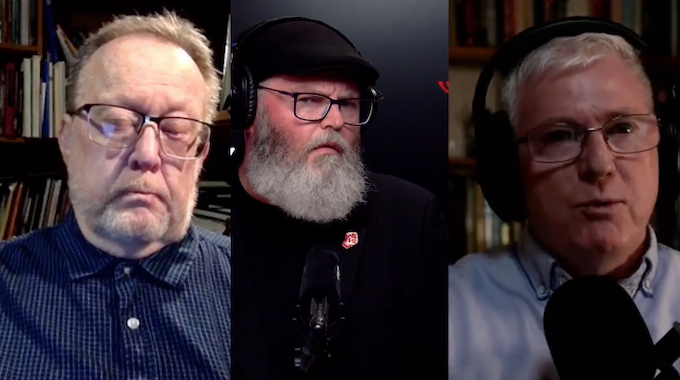Asia Pacific Report
Francesca Albanese, the UN Special Rapporteur on the Occupied Palestinian Territory, has called on countries to cut off all trade and financial ties with Israel — including a full arms embargo — and withdraw international support for what she termed an “economy of genocide”, reports Al Jazeera.
Albanese made the comments in a speech to the Human Rights Council in Geneva yesterday as she presented her latest report, which named dozens of companies she said were involved in supporting Israeli repression and violence towards Palestinians.
“The situation in the occupied Palestinian territory is apocalyptic,” she said. “Israel is responsible for one of the cruellest genocides in modern history.”
- READ MORE: Israel kills more than 300 in Gaza in 48 hours as focus intensifies on GHF
- Palestine solidarity group lawyers refer NZ prime minister Luxon, 3 ministers to ICC over Gaza
- Other Israeli war on Gaza reports
Nearly 57,000 Palestinians have been killed by Israel since the war — now in its 22nd month — began, hundreds of thousands have been displaced multiple times, cities and towns have been razed, hospitals and schools targeted, and 85 percent of the besieged and bombarded enclave is now under Israeli military control, according to the UN.
Al Jazeera’s Federica Marsi reports that Albanese’s latest document names 48 corporate actors, including United States tech giants Microsoft, Alphabet Inc. — Google’s parent company — and Amazon.
“[Israel’s] forever-occupation has become the ideal testing ground for arms manufacturers and Big Tech — providing significant supply and demand, little oversight, and zero accountability — while investors and private and public institutions profit freely,” the report said.
“Companies are no longer merely implicated in occupation — they may be embedded in an economy of genocide,” it said, in a reference to Israel’s ongoing assault on the Gaza Strip.
In an expert opinion last year, Albanese said there were “reasonable grounds” to believe Israel was committing genocide in the besieged Palestinian enclave.
The report stated that its findings illustrate “why Israel’s genocide continues”.
“Because it is lucrative for many,” it said.
Francesca Albanese v Israel’s lobby. Video: Al Jazeera
Military procurements
Israel’s procurement of F-35 fighter jets is part of the world’s largest arms procurement programme, relying on at least 1600 companies across eight nations. It is led by US-based Lockheed Martin, but F-35 components are constructed globally.
Italian manufacturer Leonardo S.p.A is listed as a main contributor in the military sector, while Japan’s FANUC Corporation provides robotic machinery for weapons production lines.
The tech sector, meanwhile, has enabled the collection, storage and governmental use of biometric data on Palestinians, “supporting Israel’s discriminatory permit regime”, the report said.
Microsoft, Alphabet, and Amazon grant Israel “virtually government-wide access to their cloud and AI technologies”, enhancing its data processing and surveillance capacities.
The US tech company IBM has also been responsible for training military and intelligence personnel, as well as managing the central database of Israel’s Population, Immigration and Borders Authority (PIBA) that stores the biometric data of Palestinians, the report said.
It found US software platform Palantir Technologies expanded its support to the Israeli military since the start of the war on Gaza in October 2023.
The report said there were “reasonable grounds” to believe the company provided automatic predictive policing technology used for automated decision-making in the battlefield, to process data and generate lists of targets including through artificial intelligence systems like “Lavender”, “Gospel” and “Where’s Daddy?”
![[AL Jazeera]](https://www.aljazeera.com/wp-content/uploads/2025/07/INTERACTIVE-UN-ISRAEL-COMPANIES-1-1751388779.png?w=770&resize=770%2C962&quality=80)
The report also lists several companies developing civilian technologies that serve as “dual-use tools” for Israel’s occupation of Palestinian territory.These include Caterpillar, Leonardo-owned Rada Electronic Industries, South Korea’s HD Hyundai and Sweden’s Volvo Group, which provide heavy machinery for home demolitions and the development of illegal settlements in the West Bank.Rental platforms Booking and Airbnb also aid illegal settlements by listing properties and hotel rooms in Israeli-occupied territory.
The report named the US’s Drummond Company and Switzerland’s Glencore as the primary suppliers of coal for electricity to Israel, originating primarily from Colombia.
In the agriculture sector, Chinese Bright Dairy & Food is a majority owner of Tnuva, Israel’s largest food conglomerate, which benefits from land seized from Palestinians in Israel’s illegal outposts.
Netafim, a company providing drip irrigation technology that is 80-percent owned by Mexico’s Orbia Advance Corporation, provides infrastructure to exploit water resources in the occupied West Bank.
Treasury bonds have also played a critical role in funding the ongoing war on Gaza, according to the report, with some of the world’s largest banks, including France’s BNP Paribas and the UK’s Barclays, listed as having stepped in to allow Israel to contain the interest rate premium despite a credit downgrade.
Which are the main investors behind these companies?
The report identified US multinational investment companies BlackRock and Vanguard as the main investors behind several listed companies.
BlackRock, the world’s largest asset manager, is listed as the second largest institutional investor in Palantir (8.6 percent), Microsoft (7.8 percent), Amazon (6.6 percent), Alphabet (6.6 percent) and IBM (8.6 per cent), and the third largest in Lockheed Martin (7.2 percent) and Caterpillar (7.5 percent).
Vanguard, the world’s second-largest asset manager, is the largest institutional investor in Caterpillar (9.8 percent), Chevron (8.9 percent) and Palantir (9.1 percent), and the second largest in Lockheed Martin (9.2 percent) and Israeli weapons manufacturer Elbit Systems (2 percent).
New Zealand referrals to the International Criminal Court
Meanwhile, the Palestine Solidarity Network Aotearoa yesterday released a report saying that it was referring two New Zealand businessmen along with four politicians, including Prime Minister Christopher Luxon, to the International Criminal Court for investigation over alleged policies relating to Gaza.
The PSNA accused the six individuals of complicity in war crimes, crimes against humanity and genocide by “assisting Israel’s mass killing and starvation of Palestinians in Gaza”.
In a statement, PSNA co-chairs John Minto and Maher Nazzal said the referral “carefully outlines a case that these six individuals should be investigated” by the Office of the Prosecutor for their knowing contribution to Israel’s crimes in Gaza.
“The 103-page referral document was prepared by a legal team which has been working on the case for many months,” said Minto and Nazzal.
“It is legally robust and will provide the prosecutor of the ICC more than sufficient documentation to begin their investigation.”

This post was originally published on Asia Pacific Report.










